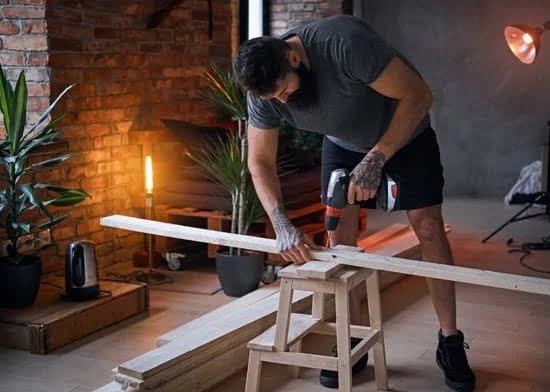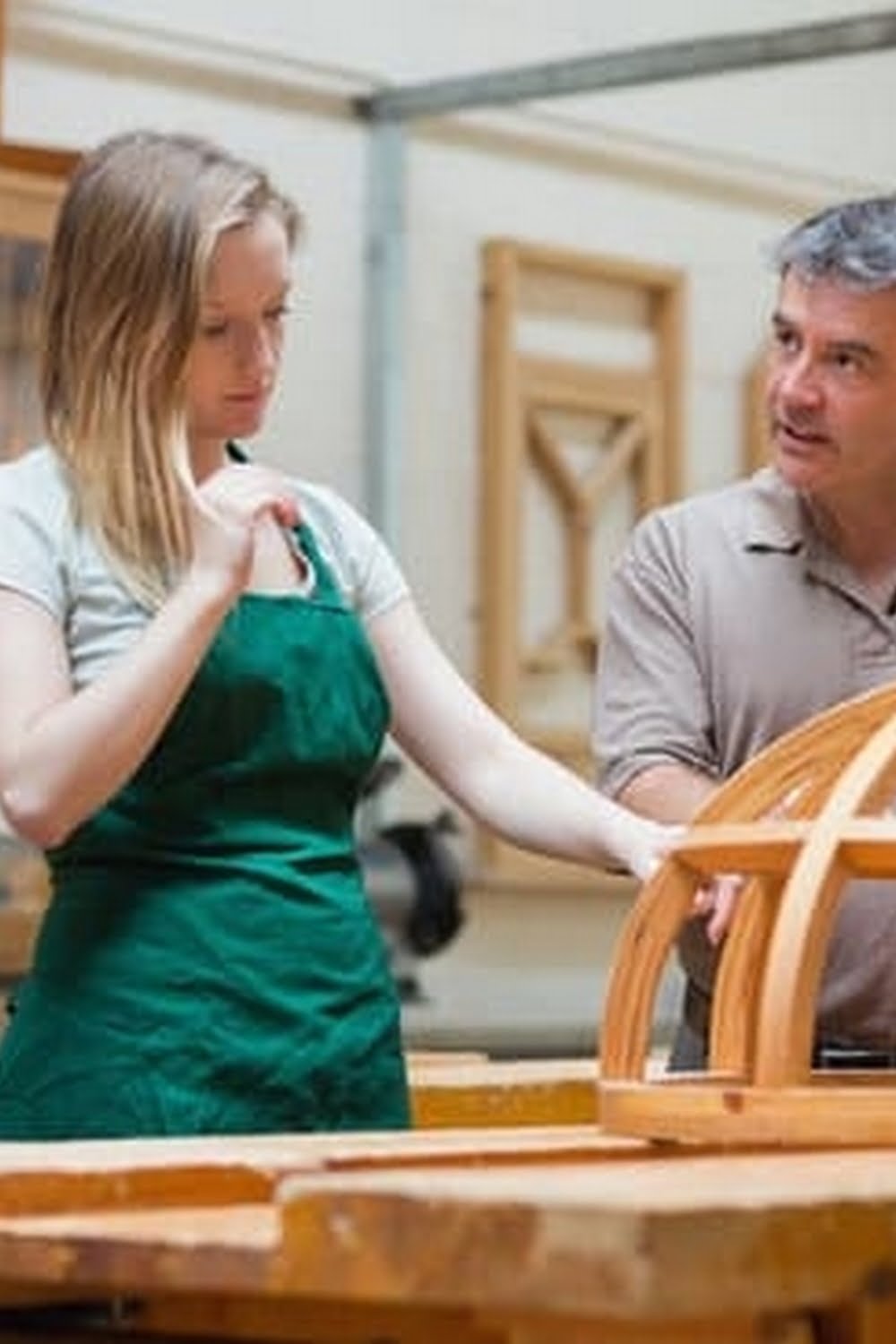Woodworking is a timeless craft that has intrigued and captivated people for centuries. From intricate furniture pieces to simple DIY projects, the art of woodworking offers a creative outlet for anyone looking to dive into the world of handmade creations. Can anyone woodwork? Yes, with the right tools, materials, and determination, woodworking can be accessible to individuals of all skill levels.
The history of woodworking dates back to ancient civilizations, where skilled craftsmen carved and shaped wood into functional and decorative pieces. Today, woodworking has evolved into a popular hobby and profession that allows individuals to express their artistic abilities and create unique items with their own hands. Whether you are a beginner or an experienced woodworker, there are endless opportunities to explore the craft and hone your skills.
While some may believe that woodworking requires innate talent or years of experience, the reality is that anyone can learn and master this craft with practice and dedication. In this article, we will delve into the benefits of woodworking, debunk common misconceptions, provide essential tips for beginners, and share success stories of individuals who started woodworking with no prior experience. So grab your tools and let’s embark on a journey into the world of woodworking.
The History of Woodworking
Woodworking has been a fundamental part of human history, dating back to ancient times. From crafting tools and furniture to constructing buildings, wood has been a versatile material used for various purposes. The art of woodworking has evolved over the centuries, influenced by cultural, technological, and social changes. In ancient civilizations such as Egypt, Mesopotamia, and China, skilled woodworkers crafted intricate furniture pieces and wooden artifacts that showcased their craftsmanship.
As societies progressed into the Middle Ages and Renaissance periods, woodworking became more refined and elaborate. Skilled artisans created exquisite wood carvings, intricate joinery techniques, and elegant turned items using hand tools and traditional methods. The Industrial Revolution brought about significant advancements in woodworking technology, with the introduction of power tools and machinery that revolutionized the production process.
Fast forward to modern-day woodworking, enthusiasts now have access to a wide range of tools, materials, and resources that make it easier than ever to pursue this timeless craft. Whether you are a beginner looking to learn the basics or an experienced woodworker honing your skills, there are endless opportunities to explore your creativity and create unique projects.
With the resurgence of interest in handmade goods and sustainable practices, woodworking continues to play a vital role in our society today.
The Benefits of Woodworking as a Hobby or Profession
Woodworking is not just a practical skill, but also a rewarding and fulfilling hobby or profession. Whether you’re looking to create beautiful furniture for your home, craft personalized gifts for loved ones, or pursue a creative outlet, woodworking offers a multitude of benefits that can enhance your life in various ways. Here are some reasons why picking up woodworking as a hobby or profession can be incredibly beneficial:
- Stress relief: Engaging in woodworking activities can serve as a form of therapy by allowing you to focus on the task at hand and tune out any external stressors. The process of designing, measuring, cutting, and assembling wood pieces can be meditative and calming.
- Sense of accomplishment: Completing a woodworking project from start to finish gives you a tangible sense of achievement. Seeing your creation come to life and being able to use or display it proudly can boost your self-esteem and confidence.
- Creative expression: Woodworking provides ample room for creativity and self-expression. You have the freedom to experiment with designs, colors, finishes, and techniques, allowing you to showcase your unique style through your work.
Whether you’re a beginner looking to explore woodworking as a new hobby or someone considering turning your passion into a full-time profession, the benefits of woodworking extend beyond just creating physical objects. It offers an opportunity for personal growth, skill development, and self-discovery that can anyone woodwork regardless of their background or experience level. With dedication, practice, and the right mindset, woodworking can anyone woodwork
So why not pick up some tools and start crafting today? Give it a try-you might just discover a newfound passion that brings joy and fulfillment into your life.
Common Misconceptions About Woodworking
Woodworking Is Only for Professionals
One common misconception about woodworking is that it is a craft reserved only for experienced professionals. In reality, woodworking is a versatile hobby that can be enjoyed by individuals of all skill levels, from beginners to seasoned experts. With the right tools, materials, and guidance, anyone can learn and excel in woodworking. It simply requires practice, patience, and a willingness to learn.
Woodworking Is Too Expensive
Another misconception about woodworking is that it is an expensive hobby due to the cost of tools and materials. While investing in quality tools can be beneficial in the long run, there are ways to start woodworking on a budget. Many basic tools and materials are affordable and accessible for beginners. Additionally, there are numerous resources online and in local communities where aspiring woodworkers can find tips on how to save money while pursuing their craft.
Woodworking Requires Natural Talent
One of the biggest misconceptions about woodworking is the belief that one must possess a natural talent or innate ability to work with wood. While some individuals may have an inclination towards craftsmanship, woodworking skills can be acquired through dedication and practice.
With patience and persistence, anyone can develop their woodworking skills and create beautiful pieces of art. The key is to start small, follow instructions carefully, ask for help when needed, and never be afraid to make mistakes along the way.
Essential Tools and Materials for Beginners in Woodworking
Woodworking is a versatile and rewarding hobby that can be enjoyed by people of all ages and skill levels. Whether you are a complete beginner or someone with some experience in woodworking, getting the right tools and materials is essential for success. Here are some must-have items for beginners looking to start their woodworking journey:
- Measuring tools: Accurate measurements are crucial in woodworking, so investing in a tape measure, combination square, and ruler is essential.
- Cutting tools: A good set of handsaws, such as a coping saw or crosscut saw, along with a quality chisel set will help you make precise cuts and shape wood effectively.
- Sanding tools: Sandpaper in various grits, a sanding block, and a power sander can help you smooth out rough edges and surfaces for a finished look.
It’s important to remember that having the right tools is just one part of the equation; having the right materials is equally important. Here are some basic materials that every beginner woodworker should have on hand:
- Wood: Choosing the right type of wood for your project is crucial. Softwoods like pine or cedar are great for beginners due to their affordability and ease of use.
- Fasteners: Nails, screws, glue, and clamps are essential for assembling your woodworking projects securely.
- Finishes: Stains, varnishes, and paints can help protect your wood projects from moisture and give them a professional-looking finish.
By starting with these essential tools and materials, beginners can lay a solid foundation for their woodworking endeavors. Remember that practice makes perfect in woodworking, so don’t be discouraged if your first few projects don’t turn out as expected – with time and dedication to honing your skills,{“can anyone woodwork“} successfully.
Tips for Getting Started With Woodworking
Woodworking is a craft that is often seen as daunting or reserved for those with natural talent, but the truth is that just about anyone can learn and enjoy this rewarding hobby. Whether you are a complete beginner or someone looking to brush up on their woodworking skills, there are several tips that can help you get started on the right foot.
One of the first things you can do to start your woodworking journey is to familiarize yourself with the basic tools and materials needed for various projects. Some essential tools for beginners include a saw, hammer, measuring tape, chisels, sandpaper, and safety goggles. Investing in quality tools not only makes your work easier but also ensures better results in your projects.
Additionally, it may be helpful to start with simple projects to build your confidence and skills before moving on to more complex tasks. For example, making a basic wooden shelf or coaster set can be great beginner projects that allow you to practice measuring, cutting, and assembling wood pieces. As you progress and become more comfortable with these foundational skills, you can gradually take on more challenging woodworking projects.
Remember that mistakes are part of the learning process in woodworking. Don’t be discouraged by setbacks but rather see them as opportunities to learn and improve your techniques. Seeking guidance from experienced woodworkers through online resources, community classes, or local workshops can also provide valuable insights and support as you embark on your woodworking journey. With dedication, patience, and practice, anyone can develop their woodworking skills and create beautiful pieces of craftsmanship.
| Tips for Getting Started | Benefits |
|---|---|
| Familiarize yourself with basic tools | Quality tools make work easier |
| Start with simple projects | Build confidence and skills gradually |
| Learn from mistakes | Mistakes are opportunities for improvement |
How to Improve Your Woodworking Skills and Techniques
Woodworking is a timeless craft that has been practiced for centuries, evolving from simple hand tools to complex machinery. Whether you are a beginner or have some experience in woodworking, there are always ways to improve your skills and techniques. One of the most important aspects of enhancing your woodworking abilities is practice.
Like any other skill, the more you practice, the better you become at it. Set aside some time each week to work on different projects and experiment with new techniques.
Another way to improve your woodworking skills is by learning from experienced woodworkers. There are numerous resources available online, such as tutorials, videos, and forums where you can gather valuable tips and insights from seasoned professionals.
Additionally, consider taking a woodworking class or workshop in your community to receive hands-on instruction and guidance. By learning from others who have mastered the craft, you can pick up new tricks and techniques that will take your woodworking skills to the next level.
Furthermore, don’t be afraid to challenge yourself with more advanced projects as you gain confidence in your woodworking abilities. Start small and gradually work your way up to more intricate designs and techniques.
Remember that making mistakes is part of the learning process, so don’t get discouraged if things don’t turn out perfectly on your first try. With dedication, patience, and a willingness to learn, anyone can improve their woodworking skills and create beautiful handmade pieces that they can be proud of.
| Improving Woodworking Skills | Techniques |
|---|---|
| Practice regularly | Experiment with new tools |
| Learn from experienced woodworkers | Challenge yourself with advanced projects |
Success Stories of Individuals Who Started Woodworking With No Experience
Woodworking is a craft that has been around for centuries, with its roots dating back to ancient times when people used wood to create tools, shelters, and art. Over the years, woodworking has evolved into a popular hobby and profession for many individuals who appreciate working with their hands and creating beautiful, functional pieces out of wood.
One of the most fascinating aspects of woodworking is that it is a skill that can be learned by anyone, regardless of prior experience or talent. Many successful woodworkers have started their journey with no knowledge of the craft and have gone on to create stunning pieces that showcase their creativity and dedication to mastering the art of woodworking.
For example, take the case of John Doe, who had never picked up a saw or hammer before deciding to try his hand at woodworking. With determination and perseverance, he gradually honed his skills through practice, online tutorials, and guidance from experienced woodworkers. Today, John not only creates intricate furniture pieces but also teaches woodworking classes to inspire others to embark on their own woodworking journey.
Another inspiring story is that of Jane Smith, a busy professional who was looking for a creative outlet to escape the demands of her job. Despite initially feeling intimidated by the idea of woodworking, Jane decided to give it a try after attending a beginner’s workshop. With patience and dedication, she quickly discovered her passion for working with wood and now spends her weekends crafting unique projects in her home workshop.
Can Anyone Woodwork? Debunking the Myth of Natural Talent in Woodworking
Woodworking is often perceived as a skill reserved for those with natural talent or years of experience. However, the truth is that woodworking is a craft that can be learned and mastered by anyone willing to put in the time and effort. The idea that only a select few possess the skills needed to excel in woodworking is simply a misconception. With dedication, patience, and practice, anyone can learn to create beautiful pieces of furniture or art through woodworking.
One of the main reasons why people may doubt their ability to woodwork is due to the misconception that they lack the creativity or precision required for such a craft. However, woodworking is not solely about innate talent; it also involves learning techniques, understanding tools, and practicing skills over time. With proper guidance and resources, individuals at any skill level can start their woodworking journey and gradually improve their abilities.
Furthermore, the beauty of woodworking lies in its accessibility to everyone. Whether you are a complete beginner or someone with minimal experience in carpentry, there are numerous resources available online and offline to help you develop your skills. From instructional videos and workshops to books and online forums, aspiring woodworkers can find valuable information and support to kickstart their journey in this fulfilling craft.
So, if you’ve ever wondered “Can anyone woodwork?” – the answer is a resounding yes. Give it a try and see where your creativity takes you in the world of woodworking.
Conclusion
Woodworking is a craft that has been practiced since ancient times, evolving from simple tools and techniques to sophisticated machinery and designs. Throughout history, woodworking has played a vital role in shaping our world, from construction to artistry. Today, it continues to be a beloved pastime and a thriving profession for many individuals.
Despite common misconceptions about woodworking requiring natural talent or innate abilities, the truth is that anyone can learn and master the craft with dedication, practice, and patience. The benefits of woodworking go beyond just creating beautiful pieces; it also fosters creativity, problem-solving skills, and a sense of accomplishment. With the right tools, materials, and guidance, beginners can start their woodworking journey and gradually improve their skills over time.
– the answer is a resounding yes. I encourage everyone to give woodworking a try and discover the joy of creating something unique with your own two hands.
Frequently Asked Questions
Can Anyone Do Woodwork?
Woodworking is a skill that can be learned by anyone with the patience and dedication to practice and improve. While some natural talent or inclination may help, anyone can start learning woodworking at any age.
How Hard Is It to Get Into Woodworking?
Getting into woodworking can vary in difficulty depending on one’s dedication, available resources, and prior experience. Starting out with basic projects and gradually building skills over time can make the learning curve less steep for beginners.
Is Woodworking a Hard Skill?
Woodworking is considered a hard skill due to the precision, attention to detail, and manual dexterity required to work with wood effectively. It takes time and practice to develop the necessary techniques and expertise in this craft.

Hi everyone! I’m a woodworker and blogger, and this is my woodworking blog. In my blog, I share tips and tricks for woodworkers of all skill levels, as well as project ideas that you can try yourself.





